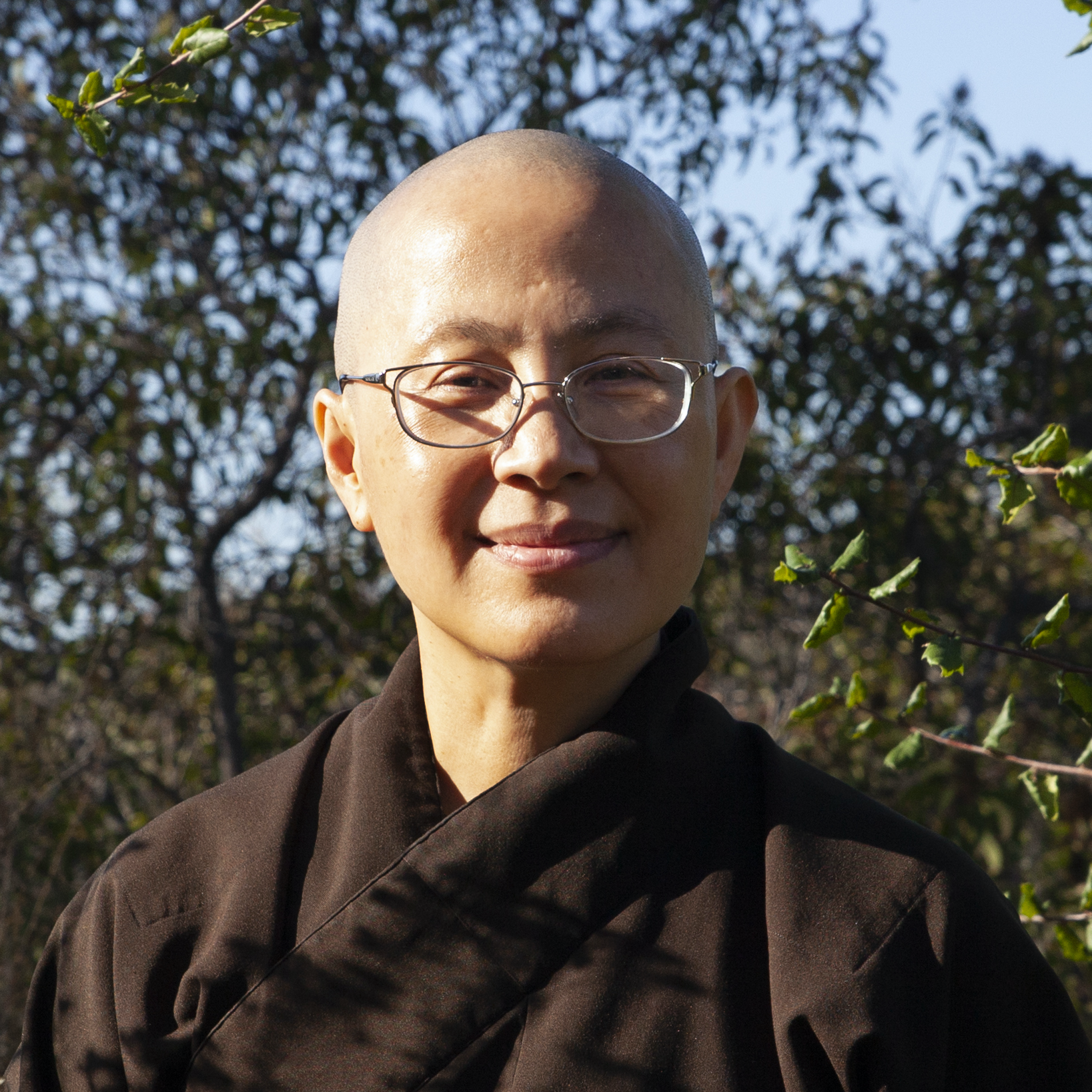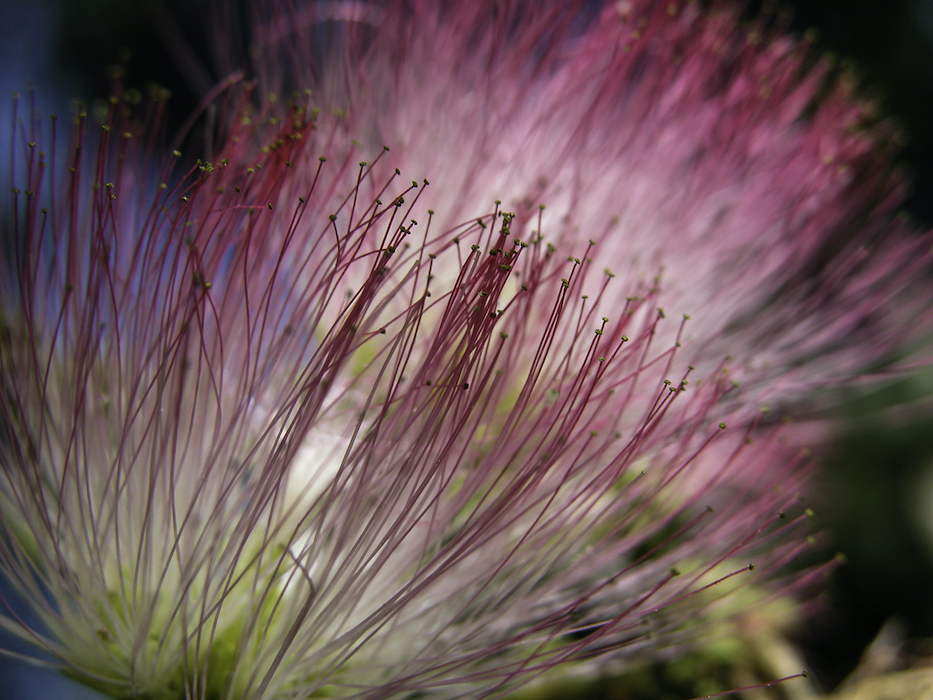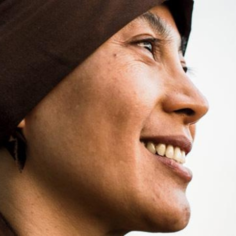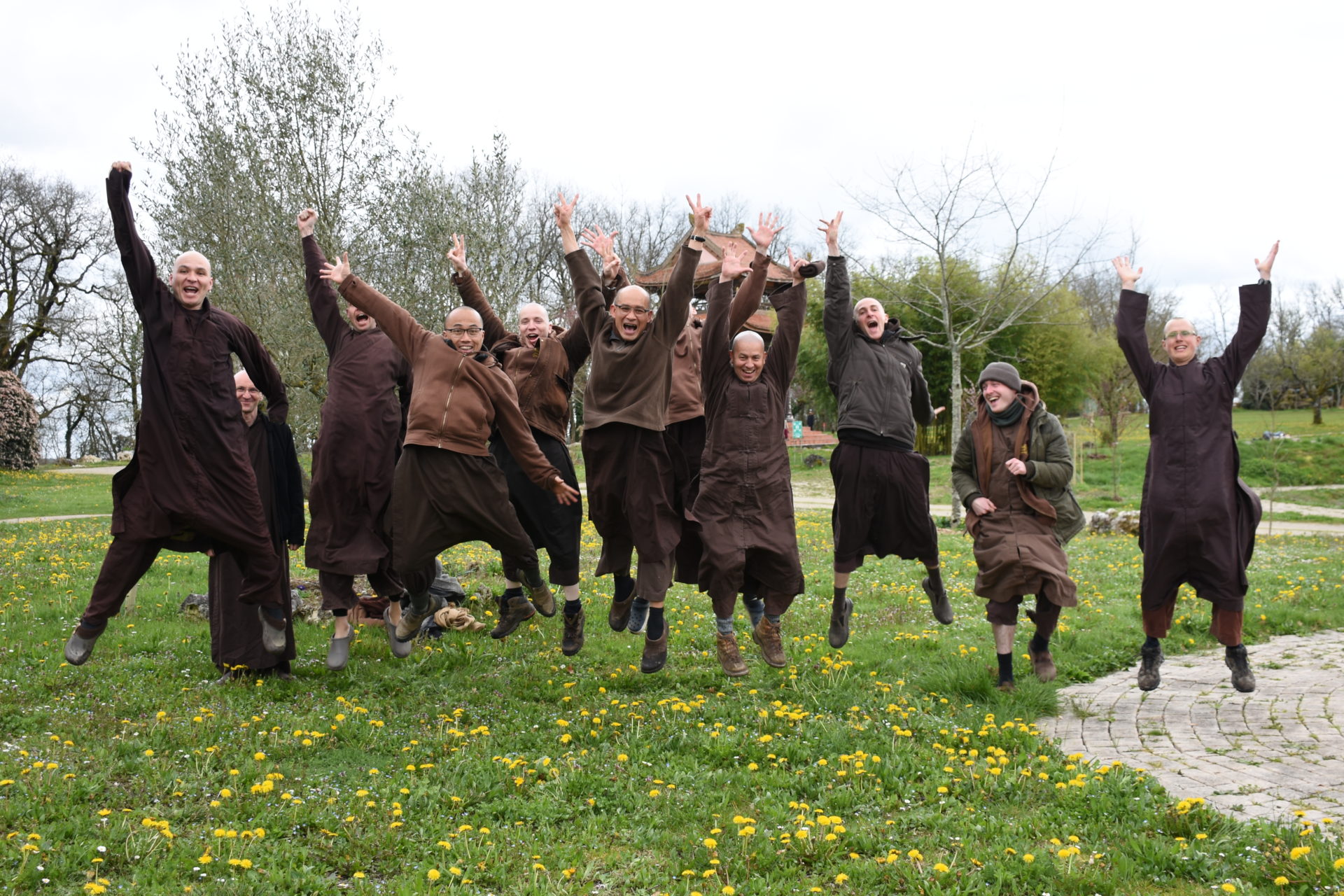Interview with Sister Dang Nghiem

This interview was conducted by Molly Cozzens, a volunteer at the Thich Nhat Hanh Foundation who practices with the Awakening Valley Sangha in Utah, United States.
Thich Nhat Hanh Foundation: Can you describe your experience transitioning from layperson to monastic?
Sister Dang Nghiem: I learned first from my grandmother, then from Thay, that Buddhism is not a religion but a way of life.
Interview with Sister Dang Nghiem

This interview was conducted by Molly Cozzens, a volunteer at the Thich Nhat Hanh Foundation who practices with the Awakening Valley Sangha in Utah, United States.
Thich Nhat Hanh Foundation: Can you describe your experience transitioning from layperson to monastic?
Sister Dang Nghiem: I learned first from my grandmother, then from Thay, that Buddhism is not a religion but a way of life. Since I was little, Grandma cared for my brother and me. I remember watching her sit so peacefully on her wooden bed, praying with rosary beads slowly running through her wrinkled hands. In later chapters of my life, when I encountered challenges—living with foster families, attending high school in a language completely foreign to me, struggling in college and medical school, striving to make a place for myself in the world—my grandmother’s image was etched so deeply into my heart that it saved me again and again. Every time I felt desperate and wanted to give up on life, I would dream of Grandma and her peacefulness and wake up feeling her strength. Grandma could only write her name with an “X,” but she was indeed living the Dharma and showing me the Dharma throughout my life.
Now, as a monastic, I have the chance to live the peace experienced by Grandma. I know how to practice with my breath, my body, my feelings, and my thoughts. I can bring peace to myself in everything I do in my daily life. The practice has enabled me to transform my suffering. And I learn to empathize and love many people without expectations. This is so liberating!
TNHF: Sometimes we feel pressure to “be somebody” through our achievements. Yet in 2020, we saw many of our sources of identity threatened: careers, education, health, beauty, relationships. How can we find peace and self-worth apart from our achievements?
DN: No matter how well you perform in school or a career, there is a sense of constant competition in our society. We put ourselves out there as if we are on auction—“I’m worth this much!”—and wait for others to give us affirmation. Their judgment is a kind of prize. But any time we are dependent on external appraisal, we can be happy in a moment and hurt in the next moment.
It is possible to be at peace with yourself: what was, what is, and what will be. As monastics, we all receive the same small amount of pocket money, have shaved heads, and own a few sets of clothes. It is very democratic. The ideas of beauty and success have been turned upside down. Yet I feel rich and happy.
To me, this is the ultimate power: to be comfortable with ourselves and be our own soulmates. Soulmate means one who remembers, who knows, and who can master themselves by taking care of their own feelings, thoughts, and body. I hardly ever feel insecure anymore, and I immediately recognize it when it arises. All I need to do is to breathe and smile with it. If I see someone very talented, rather than compete with them, I can give rise to joy and gratitude, “How lucky I am to have such a talented sister! She can help the Sangha and many people who are suffering.”
Buddhism is an art of living in harmony with ourselves and others. That is the greatest power, the greatest success.
TNHF: What is the focus of your practice at this time?
DN: I always focus on the basics, such as coming back to my breath to come back to myself. No matter what topic Thay spoke about, he always came back to mindful breathing. Mindful breathing is my soulmate. Mindful breathing enables me to be my own soulmate. I also recite gathas in coordination with my steps, like one word of a prayer at a time. These practices enable my mind to be quieter and more expansive.
Some months ago, I was going through some turbulent conflict. My mind started to think a lot, and I was having strong emotions for a couple of days. It dawned on me, “Wow, this was how I was feeling my whole life prior to practicing Buddhism! How could I ever survive such intensity of thoughts, feelings, restlessness, and angst?” It felt unbearable. Trust me, I do not ever want to go back to such a state of mind. Why do we put ourselves through such hell, day and night?

TNHF: Is it possible for a layperson to find the kind of peace you have found? Or does it require living the monastic lifestyle?
DN: We have a saying: “The easiest place to practice the Dharma is in a monastery. The hardest place is in the market.” In truth, it is totally possible to find peace in either place because we have all the seeds and capacities inside us to create love and understanding wherever we are.
If you see that as your direction, then you learn to make choices in your daily life. Choose a simple life rather than spending many hours working to pay for expensive clothing, an expensive car, an expensive house. Love what is simple, so you have time for walking meditation, time to sit before you go to work. You also learn to choose activities. There are many activities people do that are not wholesome or nourishing to them. Perhaps they go somewhere so that they can be accepted. But if you prioritize being your own soulmate, then if a group of people does not make you happy, why would you spend time with them? If some activities make you feel sad or upset afterwards, or cause you to doubt yourself, then you will not go there.
Every day, we make choices. The choice of what cereal or clothing to purchase is not real choice; companies spend trillions of dollars to research which options will appeal to consumers. But to choose our way of life and the time that we spend? That is real choice.
So choose to put down everything. Breathe for a while and smile at yourself. Say, “I love you. I’m here for you” to yourself. Not many people can make that choice. It’s due to pressure—not only social pressure, but the pressure inside ourselves, the restlessness is so ingrained in us. It’s a hard choice. But for me, it is a true choice, and I have learned not to choose other ways.
Also, I have known many lay friends over the years whose sincerity has fundamentally changed their lives. They are deep practitioners, true brothers and sisters to the monastics. You may find yourself cherishing the practice and applying it more earnestly when you have many struggles. You learn to bring flexibility and creativity to your practice.
TNHF: As a medical doctor and Buddhist monastic, you’re at the nexus of Western and Eastern well-being. Do you have any advice for staying healthy during the pandemic?
DN: A healthy body is predicated on a healthy mind. With a mind of fear toward the virus, it’s possible to become very extreme. One extreme is the paralysis we experience as we make decisions based on fear. The other extreme is to become indifferent or reckless, thinking, “It will only happen to others, not to me.” This is a sort of denial. To me, both perspectives have roots in fear. Between these two extremes, there is a middle way which helps us to do the best we can according to the guidance we’ve received, and it also opens space for us to live more deeply and to ask what we can learn from this pandemic.
The pandemic can serve as an opportunity for the contemplation and for the actual experience of interbeing. We have seen that once the virus affects one person, it can affect many others all over the world. My well-being is your well-being; your well-being is my well-being. Then, for example, rather than prioritizing certain countries, it would be better for the whole world to receive the vaccine. Because poor countries without the vaccine will likely develop a more virulent strain of the virus. This will in turn affect the whole world. The way to get through this pandemic is to see deeply the nature of interbeing, so we may take care of ourselves while simultaneously offering help to disadvantaged people in our own country and in the world. Wish other people well and do whatever we can to help them. This may begin with a kind word or gesture to an elderly neighbor or to a family member with whom we have been in an estranged relationship for a while.


